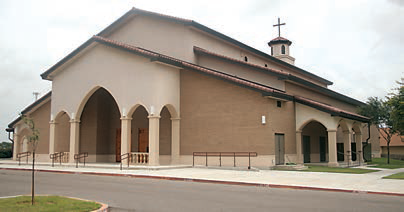Mass Times
St. Patrick Mission:
Saturday Vigil @ 4:00 p.m.
St. Thomas the Apostle:
Saturday Vigil @ 5:30 p.m.
Sunday Masses
@ 8:30 a.m. & 11:00 a.m.
Confession: By Appointment &
30 Minutes before Holy Mass
ST THOMAS the APOSTLE
WEEKDAY MASSES
MONDAY: No Mass
TUESDAY: 12:00 noon
WEDNESDAY: 12:00 noon
THURSDAY: 12:00 noon
(Holy Rosary 11:40 a.m.)
FRIDAY: 12:00 noon
(Divine Mercy 11:45 a.m.)
Parish Office Hours:
Monday, Wednesday, Friday 8:00 a.m. - 11:00 a.m.
Tuesday & Thursday 8:30 a.m. - 11:30 a.m. and 1:00 p.m. - 4:00 p.m.
Message from the desk of the Pastor:

God speaks to us in many ways, including through the Sunday Scripture readings.
The Sunday Connection from Loyola Press provides useful background and activities to better understand the upcoming Sunday's Scripture readings, helping you to connect the Scripture to daily life in a meaningful way.
THE EPIPHANY OF THE LORD
Sunday, January 4, 2026
Gospel Reading
Matthew 2:1-12
The Magi seek out Jesus and do him homage.
Background on the Gospel Reading
The visit of the Magi occurs directly before the story of the Holy Family’s flight into Egypt. Matthew’s Gospel tells a version of Jesus’ birth that is different than the one in Luke. Of the actual birth of Jesus, Matthew tells us little more than, “When Jesus was born in Bethlehem of Judea, in the days of King Herod . . . ” The story of the census is found only in Luke’s Gospel, but we hear about the visit of the Magi only in Matthew’s Gospel.
We know little about the Magi. They come from the East and journey to Bethlehem, following an astrological sign, so we believe them to be astrologers. We assume that there were three Magi based upon the naming of their three gifts. The Gospel does not say how many Magi paid homage to Jesus. In Matthew’s Gospel, they represent the Gentiles’ search for a savior. Because the Magi represent the entire world, they also represent our search for Jesus.
We have come to consider the gifts they bring as a foreshadowing of Jesus’ role in salvation. We believe the meaning of the gifts to be Christological. Gold is presented as representative of Jesus’ kingship. Frankincense is a symbol of his divinity because priests burned the substance in the Temple. Myrrh, which was used to prepare the dead for burial, is offered in anticipation of Jesus’ death.
The word Epiphany means “manifestation” or “showing forth.” Historically several moments in Christ’s early life and ministry have been celebrated as “epiphanies,” including his birth in Bethlehem, the visit of the Magi, his baptism by John, and his first miracle at Cana.
Family Connection
The tradition of giving gifts at Christmas is thought by some to be rooted in the gift giving of the Magi. In many cultures, gifts are not exchanged at Christmas, but rather on the feast of the Epiphany. Whenever you exchange your Christmas gifts, take some time to reflect on this tradition of gift giving at Christmas. Think of the best gift you have received. What was it? What made it special? Was it the gift itself, the thought that went into it, or the person who gave it to you?
Read today’s Gospel, Matthew 2:1-12. The gifts of the Magi—gold, frankincense, and myrrh—have come to be understood as symbols of Christ’s royalty, divinity, and eventual suffering and death. They are special because in giving them, the Magi acknowledge who Jesus was to be: our Savior. We pray that we will acknowledge Jesus as Savior in all that we do and say. Conclude by singing together “We Three Kings.”
-
Ministries
ButtonSpreading faith and love












